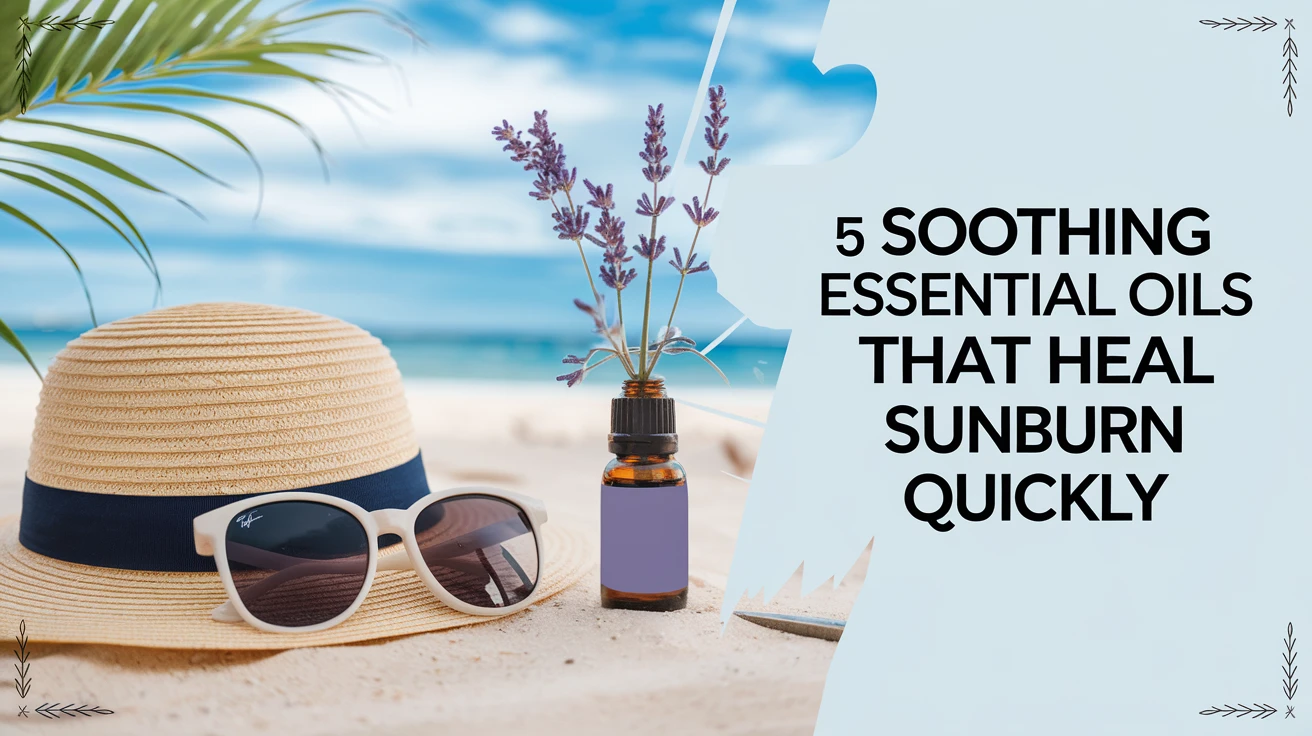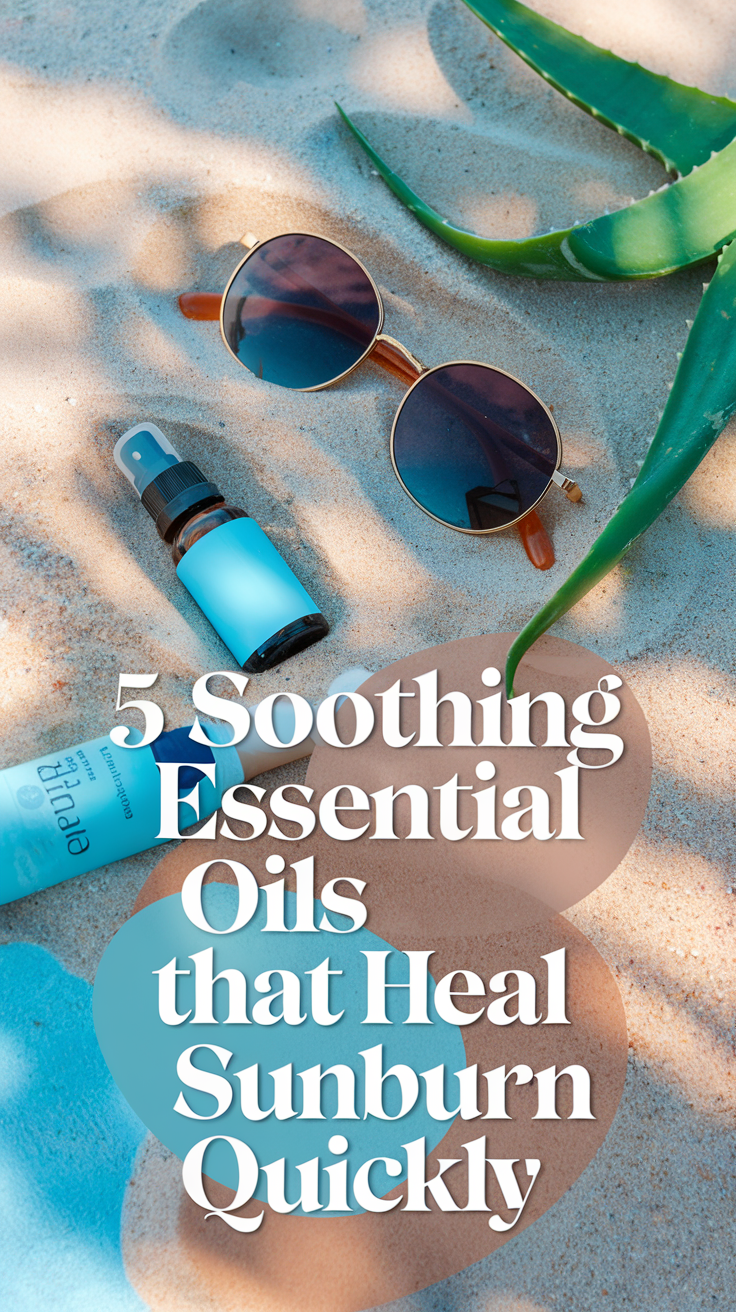
Getting sunburned is never part of the plan, but sometimes even the most diligent sun protection efforts fall short. When that happens, essential oils can be your skin’s best friend. These natural remedies have been used for centuries to soothe and heal various skin conditions, including the painful aftermath of too much sun exposure. In this comprehensive guide, we’ll explore five powerful essential oils that can help heal your sunburn quickly and effectively, providing relief when you need it most.
Before we dive into the specific oils, it’s important to note that I’ve personally tested these remedies after countless beach days gone wrong. As someone who has battled with sensitive skin and occasional sunburns, I’ve found these natural solutions to be incredibly effective when used properly.
Lavender Essential Oil: Nature’s Cooling Touch
Lavender essential oil stands at the forefront of sunburn treatment, and for good reason. I discovered its magical properties during a particularly nasty sunburn after falling asleep on the beach. Within hours of applying diluted lavender oil, the redness and discomfort began to subside.
Key Benefits of Lavender Oil for Sunburn:
– Immediate pain relief
– Reduces inflammation
– Prevents peeling
– Promotes skin regeneration
– Helps prevent scarring
Application Methods:
| Method | Recipe | Usage |
|---|---|---|
| Cooling Spray | 10 drops lavender + 1 cup witch hazel | Spray every 2-3 hours |
| Soothing Gel | 5 drops lavender + 2 tbsp aloe vera | Apply 3-4 times daily |
| Bath Soak | 15 drops lavender + 1 cup colloidal oatmeal | Soak for 15-20 minutes |
Peppermint Oil: Cool Relief for Hot Skin
The cooling sensation of peppermint essential oil provides immediate relief from the burning sensation of sunburn. Its menthol content creates a natural cooling effect that can help reduce the skin’s surface temperature.
Benefits of Peppermint Oil Treatment:
– Instant cooling sensation
– Pain relief
– Reduces inflammation
– Antimicrobial properties
– Helps prevent infection
Safe Usage Guidelines:
| Skin Type | Dilution Ratio | Carrier Oil |
|---|---|---|
| Normal | 2-3 drops per tablespoon | Coconut oil |
| Sensitive | 1-2 drops per tablespoon | Jojoba oil |
| Very Sensitive | 1 drop per tablespoon | Sweet almond oil |
Tea Tree Oil: Your Skin’s Natural Protector
Tea tree oil’s antimicrobial properties make it an excellent choice for preventing infection in sunburned skin. When I worked as a lifeguard, this was always in my first-aid kit for treating sun-related skin issues.
Essential Properties:
– Prevents bacterial growth
– Reduces inflammation
– Accelerates healing
– Provides mild pain relief
– Helps prevent blistering
Treatment Protocol:
1. Clean the affected area gently
2. Mix 3-4 drops of tea tree oil with 2 tablespoons of coconut oil
3. Apply carefully to sunburned areas
4. Repeat 2-3 times daily
5. Continue treatment until skin heals completely
Chamomile Oil: Gentle Healing for Sensitive Skin
Chamomile essential oil is particularly effective for those with sensitive skin, offering gentle yet powerful healing properties. Its anti-inflammatory properties help reduce redness and swelling while promoting skin regeneration.
Best Practices for Application:
– Always dilute properly (3-4 drops per tablespoon of carrier oil)
– Apply gently using clean hands
– Avoid rubbing or massaging sunburned skin
– Reapply every 4-6 hours
– Store remedies in dark glass bottles
Recommended Carrier Oils:
1. Sweet almond oil
2. Jojoba oil
3. Calendula-infused oil
4. Coconut oil
5. Argan oil
Eucalyptus Oil: Refreshing Relief for Sunburned Skin
Eucalyptus essential oil provides a unique combination of cooling relief and healing properties. Its ability to reduce inflammation while promoting circulation makes it an excellent choice for sunburn recovery.
Application Tips:
– Start with a patch test
– Use in combination with aloe vera
– Apply morning and evening
– Store in a cool, dark place
– Keep away from eyes and mucous membranes
Quick Relief Spray Recipe:
– 10 drops eucalyptus oil
– 5 drops peppermint oil
– 3 drops lavender oil
– 1 cup witch hazel
– 1/4 cup aloe vera juice
Mix in a spray bottle and apply as needed.
Conclusion
While prevention is always better than cure when it comes to sun exposure, these essential oils provide effective relief when sunburn strikes. Remember to always dilute essential oils properly and perform a patch test before full application. Keep these natural remedies in your summer first-aid kit, and you’ll be prepared to handle any unexpected sun exposure with confidence.
Key Takeaways
- Always dilute essential oils properly with carrier oils before applying to sunburned skin
- Combine different essential oils for maximum benefit, but don’t exceed recommended dilution ratios
- Store essential oil remedies properly to maintain their effectiveness
- Continue treatment until skin is fully healed to prevent long-term damage
- Consider preventive measures alongside treatment for optimal skin health
Frequently Asked Questions
How soon after getting sunburned should I apply essential oils?
Apply diluted essential oils as soon as you notice sunburn developing. Early intervention can help minimize damage and speed up healing.
Can I use essential oils on severe sunburns with blisters?
For severe sunburns with blisters, consult a healthcare provider first. Once approved, use very gentle dilutions and avoid direct application to blistered areas.
How often should I apply essential oils to sunburned skin?
Apply diluted essential oils 3-4 times daily for mild to moderate sunburns, or as needed for comfort. Reduce frequency as healing progresses.
Can I mix different essential oils together?
Yes, you can create synergistic blends, but ensure the total amount of essential oils doesn’t exceed the safe dilution ratio for your skin type.
What carrier oils work best for sunburn treatment?
Light, non-comedogenic carriers like jojoba, sweet almond, or coconut oil work best. Avoid heavy oils that might trap heat in the skin.
How long does it take to see results with essential oils?
Most people experience immediate relief from pain and burning. Visible improvement in redness and inflammation typically occurs within 24-48 hours.
Are essential oils safe for children’s sunburns?
Use extra caution with children. Consult a healthcare provider and use half the normal dilution ratio recommended for adults.
Can essential oils prevent sunburn?
While some essential oils have mild sun-protective properties, they should not replace conventional sunscreen for prevention.
What should I do if I experience irritation from essential oils?
Discontinue use immediately and rinse the area with cool water. If irritation persists, seek medical attention.
Can I use essential oils on face sunburns?
Yes, but use extra dilution (half the normal ratio) and avoid the eye area. Consider using gentler oils like lavender or chamomile for facial application.


